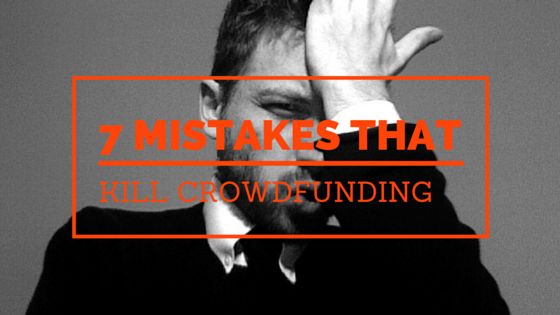We’ve seen more civic crowdfunding projects come through our site than stetsons at a barn dance (that’s a lot) and so we have picked up a clever move or two. However there are certain things that will kill your project before you even get started and these are the seven deadly sins of crowdfunding.
- Not getting your family and friends involved
This is a big deal. You need to have these guys lined up on day zero of your crowdfunding campaign. They need to be there when it kicks off. We’ve found time and time again that having zero pledges on day one greatly increases your chances of having zero pledges at the end of the campaign. It doesn’t have to be much, but the more people you get in early, the less of a barrier people coming later find it. If your friends and family or people in the office won’t pledge to the project, why should anyone else.
- Being afraid to ask: local press/blogs/people
Honestly, asking is a big thing. We’re taught not to ask for things. But you need to flip it on its head for a funding campaign. When you present your project, get it out to as many people as possible – local blogs are often grateful for content, as are local papers. Getting out there and approaching local businesses is important too. Supporting a local civic project is an easy and fairly inexpensive way of getting their name out there.
- Not thinking about your audience
Crowdfunding is about popularity. And that’s a lot of work. There’s no two ways about it, if it’s not something you’re comfortable ‘selling’ and pushing to an audience, then it’s going to be tough. Really tough. Before you start, think, “Who is the audience for this project? Who’s going to use it? How do I reach them?”
- Assuming everyone will love it just as much as you do
Your project is great. It’s going to change the face of area, of course it is. And you know that. But other people don’t, or not yet, anyway. You need to show them why they should love it. Show, don’t tell. Think features and benefits. “It does THIS thing, and that’s GREAT, because…”
- Thinking that money will appear ‘from the internet’
We’ve had a couple of projects where people have asked us what we’re doing to promote their project. That’s the wrong way to think about it. We do run press and introductions for projects, but crowdfunding isn’t magical pennies from heaven. It’s another funding source alongside grants and corporate donations for civic projects, and it takes work. Sadly, the internet isn’t a fountain of cash – as we’ve said above, it’s about audience and local connection. Once you’ve got over those first humps, then you can use the platform as leverage to apply for grants, or sponsorship.
- Ignoring social media
Social media is crucial to the success of a crowdfunding campaign. It’s a system that’s built round the internet, so you need to broadcast (appropriately) on as many channels as you can – Facebook and Twitter, YouTube and Pinterest, Tumblr and LinkedIn. It’s all about where your audience is, and showing them why they might love your project.
- Ditching offline fundraising
Crowdfunding is built on internet platforms, but when it’s civic projects, you can’t overlook the importance of getting funding from your local area. All of the traditional things you’d do to raise money have been successful on Spacehive – sponsored silences, bag packing in supermarkets, and running marathons. They’re all there, and they’ve helped create a rich tapestry of funding.
So – there you have it. A few fairly common-sense things that we’ve seen projects really struggle to recover from. They’re easily avoided and making sure you do will get your crowdfunding campaign off to a running start!

